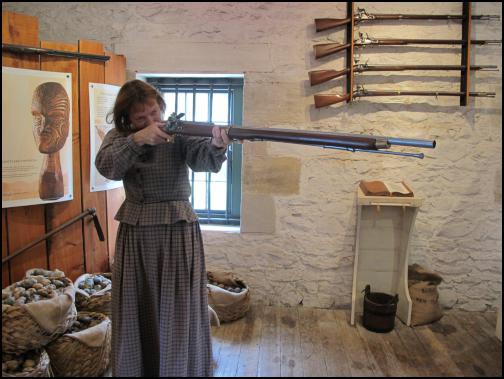Sale of muskets a hit at Kerikeri Mission

Caption: Deborah McKechnie of the Stone Store checks out one of the new muskets – on sale now.
February 3
MEDIA RELEASE
Sale of muskets a hit at Kerikeri Mission
The musket trade has begun at the Kerikeri Mission Station.
Beautifully made non-firing replicas of the original ‘Brown Bess’ musket – which were traded between ship merchants in the Bay of Islands and Maori – are now on sale at the Stone Store.
“These are reproductions of muskets that were sold and traded in the early years of the 19th Century at the time when the Church Missionary Society was establishing its mission at Kerikeri,” says Liz Bigwood, the Manager of the Kerikeri Mission Station, which is cared for by the NZ Historic Places Trust.
“The Brown Bess was the standard musket used as the British Empire expanded around the globe. It was also much prized by Maori as a weapon of war.”
One of the trade goods that enabled Maori to acquire these highly sought after weapons on a large scale was the humble potato.
Extensive cultivations of potatoes established by Ngapuhi at Kerikeri, Waimate North and beyond – coupled with constant demand for spuds from settlers – was such that Ngapuhi chief Hongi Hika was able to trade them for muskets on a military scale.
Armed with newly acquired fire-power, he then attacked other tribes around Northland and further afield. As well as funding the purchase of muskets, potatoes also provided sustenance for Hongi’s war parties on the move.
“The weapon was used by Maori warriors during the Musket Wars during the 1820s, as well as by British soldiers through to 1838, when they were superseded by the percussion cap smoothbore musket,” says Liz.
“In all, the Brown Bess was used by the British military, with minor modifications, between 1722 and 1838 – an extraordinary length of service.”
The Brown Bess wasn’t the most accurate of guns, though it was very effective when used in mass volleys against an enemy and in bayonet charges. A musket ball could inflict a great deal of damage when it hit its target – and the length of the gun allowed for longer reach in bayonet fighting.
Conjecture surrounds the origins of the name Brown Bess – including an unlikely explanation that it was named after Elizabeth I. The term is more likely to have come from the German words ‘Brawn Buss’ [‘strong gun’] or ‘Braun Buss’ [‘brown gun’].
Firing a Brown Bess involved a convoluted process of tearing a paper cartridge open (usually using teeth) priming the firing pan using some of the gunpowder from the cartridge; standing the musket up and pouring the rest of the powder down the barrel; then tamping the paper cartridge envelope, including the musket ball, onto the powder charge with a ramrod.
“The small pan used to hold charges of gunpowder near the musket’s flint has made its own contribution to the English language. In situations when the trigger was pulled and the gunpowder flared up but failed to ignite the charge that fired the musket ball, the result was ‘a flash in the pan’,” says Liz.
The rate of fire ranged from one shot every 15-20 seconds in the hands of a skilled user, to about two shots per minute in the hands of a novice.
“It wasn’t exactly rapid fire, but it was deadly in the right hands – and even more lethal if you didn’t have something similar to fight back with.”
Freelance artist Augustus Earle, recorded his own perspective of Ngapuhi and muskets in his memoirs of his travels around New Zealand, entitled A Narrative of a Nine Months’ Residence in New Zealand in 1827:
“Potatoes were planted, hogs were reared, and flax prepared, not for their own use or comfort, but to exchange with the Europeans for firearms. Their plans succeeded; and they have now fairly possessed themselves of those weapons, which at first made us so formidable in their eyes; and as they are in constant want of fresh supplies of ammunition, I feel convinced it will always be their wish to be on friendly terms with us, for the purpose of procuring these desirable stores.”
Earle’s journal highlighted the value Maori attached to the Brown Bess.
“I know, from experience, that the New Zealanders [Maori] will rather put up with injuries than run the risk of offending those who manufacture and barter with them such inestimable commodities.”
The replica Brown Bess muskets are on sale at the Stone Store, along with a host of authentic missionary trade goods and a great selection of classic Kiwiana products. The Stone Store is open seven days a week (closed Christmas Day).
For more information on NZHPT properties in Northland visit www.historicplaces.org.nz
ENDS


 NZ Symphony Orchestra: NZSO To Tour Masterworks By Mozart, Beethoven, Haydn And More
NZ Symphony Orchestra: NZSO To Tour Masterworks By Mozart, Beethoven, Haydn And More Journal Of Public Health: Vape Shops Cluster Around Schools
Journal Of Public Health: Vape Shops Cluster Around Schools Timaru District Council: Aigantighe Art Gallery Hosts An Iconic Robin White Touring Exhibition
Timaru District Council: Aigantighe Art Gallery Hosts An Iconic Robin White Touring Exhibition Victoria University of Wellington: Dame Winnie Laban Awarded Honorary Doctorate Recognising Achievements For Pasifika
Victoria University of Wellington: Dame Winnie Laban Awarded Honorary Doctorate Recognising Achievements For Pasifika  HESSA: This Isn’t Fair—And It’s Time To Fix It - HESSA Petition Calls For Inclusive Student Sports
HESSA: This Isn’t Fair—And It’s Time To Fix It - HESSA Petition Calls For Inclusive Student Sports Post Primary Teachers' Association: PPTA Calls On Minister Stanford To Come Clean On Kāhui Ako
Post Primary Teachers' Association: PPTA Calls On Minister Stanford To Come Clean On Kāhui Ako 